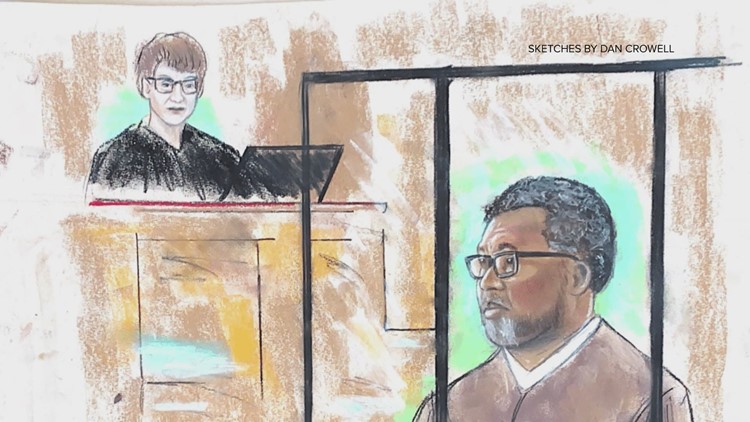DALLAS — Two undercover FBI agents posing as developers plied Dwaine Caraway with thousands of dollars hidden in cigar boxes, trips to The Lodge strip club, Winstar Casino and dog racing tracks while he was campaigning for a fifth term on Dallas City Council in 2016 and 2017, the disgraced politician testified Wednesday in federal court.
Agents recorded their meetings with Caraway, including some after he was back on council, in which he appeared to promise to back their fictitious projects in exchange for money, but Caraway was never charged with any of that activity. Instead, authorities convinced him to plead guilty to taking real bribes in yet another scheme -- the Dallas County school stop arm camera scandal. Caraway admitted taking $450,000 from 2011 to 2017 in that case.
Federal authorities also secured his cooperation as an informant.
RELATED: Former councilman Dwaine Caraway, already in jail over bribes, testifies about more bribes he took
His target was Ruel Hamilton, who is currently on trial in Dallas federal court accused of bribing Caraway and the late former council member Carolyn Davis.
Hamilton has pleaded not guilty.
Hamilton’s defense lawyer Abbe Lowell elicited all these salacious details from Caraway on the witness stand Wednesday to highlight the stark differences between Hamilton’s experience with the former councilman – one phone call and one meeting where a $7,000 check changed hands – and the flamboyant activities Caraway undertook with the undercover FBI agents, and the enormous sum of money he took in the DCS case.
Lowell also noted that bribes are normally paid in cash, so they’re harder to trace. His client Hamilton gave Caraway a personal check, in his own name, and only after, according to Lowell, Caraway mentioned he needed help paying his ailing mother’s mounting medical bills. It was far from a bribe, Lowell argued, and was actually evidence of his client’s willingness to help a friend in need.
Prosecutor Chad Meacham balked at that notion, arguing that Hamilton wanted Caraway’s help with stalled real estate deals he wanted done in Caraway’s southern Dallas council district. Meacham asked Caraway directly if he believes Hamilton wrote him a check to help with medical bills. No, Caraway answered.
“Bribe by check?” Meacham asked Caraway.
“Yes,” he answered.
Prosecutors say Hamilton’s ultimate goal in paying Caraway and giving $40,000 to Davis was to get their help securing approval for his affordable housing projects.
Hamilton wanted his Royal Crest apartment project to win lucrative tax credits from the state, and to do that, it had to win the approval of the Dallas City Council, prosecutors allege. The complex is in Caraway’s district, and Davis was chair of the council housing committee at the time the project was up for consideration. Prosecutors say both pledged to help Hamilton.
Caraway has not been charged in Hamilton’s case because he cooperated with prosecutors and the FBI. Davis pleaded guilty, but died in a car crash in 2019 before she could testify.
Hamilton stood to gain a $2.7 million developer fee for Royal Crest if his tax credit application was approved, according to testimony Wednesday by Brooke Boston with the Texas Department of Housing and Community Affairs, which awards the tax credits based on a point system and recommendations by local officials.
She testified that the competition among developers for approval for tax credits is fierce, as only a certain amount of them are awarded each year.
Prosecutors say Hamilton needed the illicit help to push his project because it did not meet the criteria for approval by the city. Ultimately, Royal Crest did not get the tax credits.
Developers trying to buy influence to get tax credits was the crux of the city’s last big bribery case.
Former Dallas City Councilman Don Hill was convicted in 2009 and sentenced to 18 years for taking bribes from a developer seeking the same type of tax credits. He died in 2017 shortly after he got an early medial release from prison.



